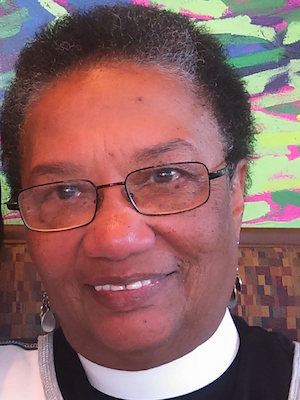 I have often told this story to congregations when preaching. There was a man in a bookstore interested in a religious book. He turns the cover over and sees the author is a woman priest. He frowns instantly. The picture of a feminine smiling face stares at him head on. He is instantly uncomfortable. He says to his companion, “I could never be ministered to by a female priest. The whole time in the pew I would have sexual fantasies.” His companion absorbed his words. And then said to him after a minute of contemplation, “Well, I guess you know now what your wife has been doing the last three decades on Sunday mornings.”
I have often told this story to congregations when preaching. There was a man in a bookstore interested in a religious book. He turns the cover over and sees the author is a woman priest. He frowns instantly. The picture of a feminine smiling face stares at him head on. He is instantly uncomfortable. He says to his companion, “I could never be ministered to by a female priest. The whole time in the pew I would have sexual fantasies.” His companion absorbed his words. And then said to him after a minute of contemplation, “Well, I guess you know now what your wife has been doing the last three decades on Sunday mornings.”
When I tell that very true story, the congregation’s laugh is nervous and then they are quiet. Their assumptions about women and sexuality aren’t very funny. It is too close to the truth. I had men question me when I was about to become a priest. It was in the ordination process when I was asked how I could be a priest when I was separated from my husband. They were not questioning my fitness for the intricacies and nuances of a very rewarding but difficult job. But they had already put into judgement my moral conscience, that my personal married life had bearing on pastoral care, meeting the needs of a congregation, Bible Study, providing services for the poor, forgotten and hungry. I was a woman and therefore my existence was one of judgment by men.
I am vividly aware of the intersecting of narratives during this the 40th anniversary year of the ordination of women into the Episcopal Church. Some eight years later, I was ordained. Bishop Rusak, my ordaining bishop, said no one would hire me but he was vastly incorrect. Charles Bennison of St. Marks, Upland offered me a position. And yet, in 2016, women who are pregnant are still questioned about their efficacy of being mothers and being priests when what we know about priesthood, the morality of it, is to be mothers to all, to love, to give, to pray, to worship, to honor. The quiet truth is women remind men of sexuality which conflicts head on with the comfortable myth of priests’ asexuality.
In 1988, I was the first ordained woman to speak at the Lambeth Conference in Canterbury, England. As I stood there to begin my remarks, facing me was a sea of male faces staring at me. To them, a black woman born in Chicago was an anomaly, something they could not imagine to be present and coexistent in their world. At the same time I was giving my Lambeth speech, in Atlanta, Georgia, Sierra Wilkinson was a toddler doing things all two years old do. She had no understanding of women and priesthood and liberation and justice. But 28 years later, in 2016, that toddler would be a priest in Savannah, Georgia, one who led a congregation while pregnant. She was the beneficiary of history. Women in faith and in courage who in 1977 became priests and crossed a barrier, and in one sense took the long walk home.
I remember when my children were confirmed in Chicago in 1969. The Episcopal nuns told me my son and my daughter would never remember a time when they did not take communion. At the time, that was comforting. My children would always know the bread of Christ.
The same can be said for the women who walk the aisles and stand in the pulpits and visit the hospitals and marry and baptize and sit in vestry meetings and house the homeless and feed the poor. They too will always know the bread of Christ. Forty years have come and gone. We didn’t disappear into dust, as many men wanted. We did multiply, as many dreamed. We are not perfect, as we lead congregations. But we are equal.
When men are oppressed, it has been said, it is a grand tragedy. When women are oppressed, it is a tradition.
Tradition broken for all the right reasons. Hallelujah.



